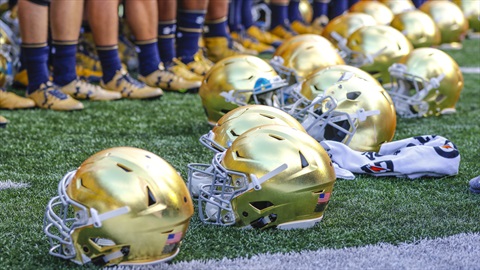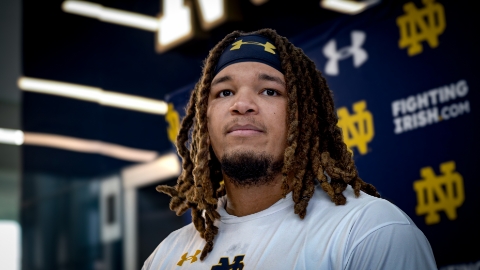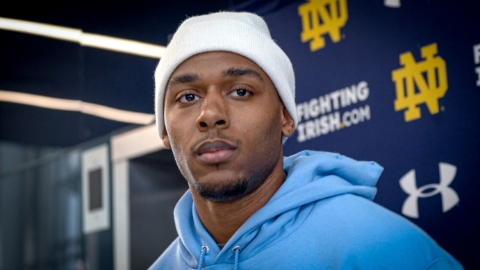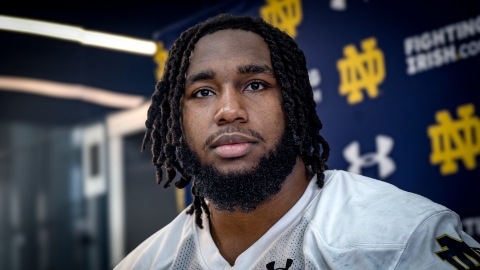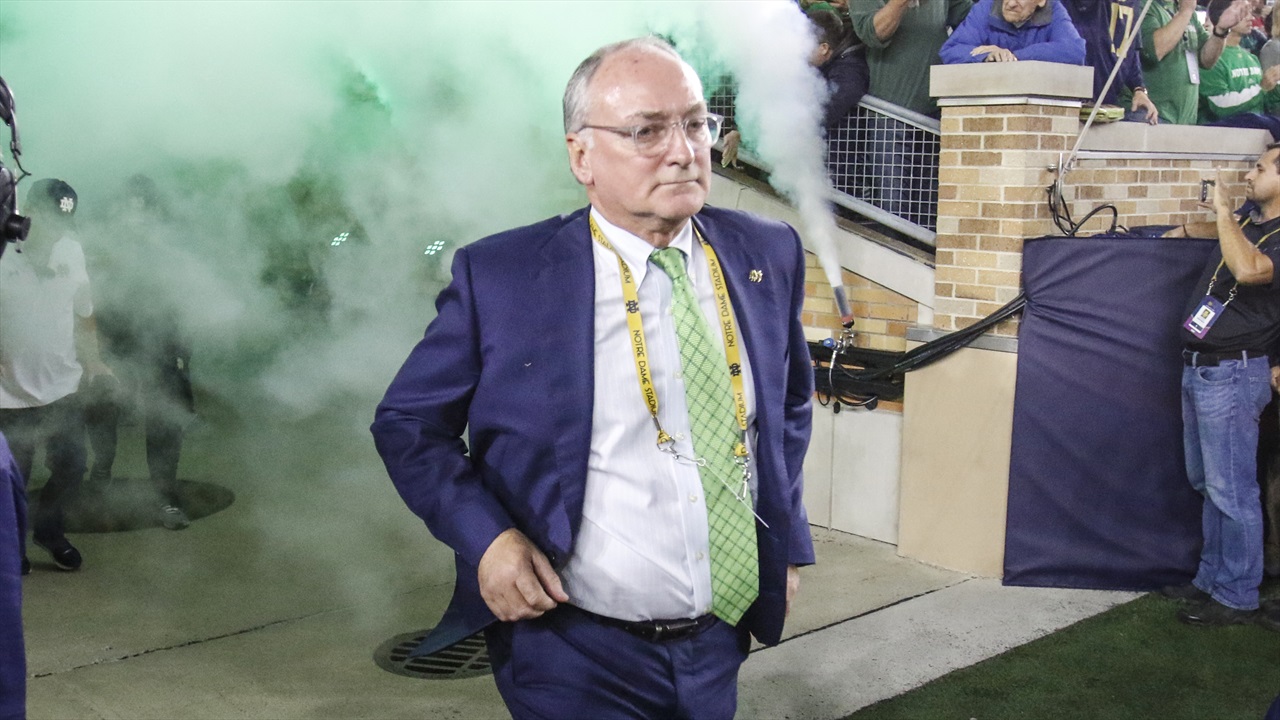
Jack Swarbrick very obviously envisioned considerable success for Brian Kelly – it's quite obviously why Swarbrick chose to hire Kelly more than a decade ago as the CEO of Notre Dame football.
Now, Kelly's navigating the Fighting Irish through unprecedented times in college football and on the cusp of breaking Knute Rockne's all-time Notre Dame football wins record in the process.
Swarbrick talks with Irish Sports Daily about Kelly's longevity, College Football Playoffs seemingly imminent 12-team expansion, Link Jarrett's success, Mike Brey's basketball reset and more in Part II of our exclusive question-and-answer session with Notre Dame's veteran director of athletics.
IRISH SPORTS DAILY: To the College Football Playoffs, how would you characterize the process of the past two years to even get to the point where there's a 12-team proposal and what were perhaps some of the most tense moments for you during that time?
JACK SWARBRICK: In this job, or any version of this job, you're on committees, working groups and stuff like that all the time. This was the best experience of that nature that I've ever had. Greg Sankey, Bob Bowlsby, Craig Thompson and I just worked so well together, to go two years and not have a single leak, by and large the world didn't know we were operating. The collegiately, the sort of give-and-take, it was just so good. For all the pressure we felt to get it right, the working environment was maybe the best I've ever been a part of. And I treasure the time we spent together and the progress we made.
None of us came into this thinking anything close to the model we came up with, and that's a testament to how well the process worked.
ISD: How important do you think the 12-team model is, or some variation of a College Football Playoffs expansion or iteration of that for the overall health and well-being of college football?
JS: Very. In a way we haven't really been able to articulate publicly yet, because we want the input of people within college athletics first, but there are two very important aspects of it that go to your question.
The first is that football players have such a smaller opportunity to participate in the postseason than their peers. Most college sports, you have a 21 to 24-percent chance of being in the postseason. In football (at the Football Bowls Subdivision level), you've got a 3-percent chance [of making the current, four-team playoffs).
And going to a bowl game is not a substitute for that. You want to try and play for a championship. So expanding, finding a way to expand that opportunity, became very important to us.
Closely related to that was recognizing the obligation to strengthen the game, not just your part of the game. Very deliberate choice to say the six highest-ranked conference champions, not the Power 5 conference champions plus one was really about that.
And about saying to all the conferences, you've got something to play for.
ISD: Obviously, there wasn't a significant conversation surrounding the proposal for a College Football Playoffs expansion to 12 teams that you were not involved in. So, what went into the decision or concession to say that Notre Dame cannot be one of the top four teams to earn a bye?
What happens if there's a scenario where Notre Dame beats both, let's say Stanford and USC, which has happened several times in recent years, and then one of those teams wins the Pac-12 Conference Championship game and gets a bye while you play the opening round?
JS: It was borne largely of two things:
One was the need to reflect the dynamic that already existed in the selection procedures to reward conference championships. This was part of what the CFP was founded on.
So, in this model, how do you do it? It became part of the question. So, that was one.
From my perspective, of potentially greater importance was, I had become so frustrated by the discussion about 12 versus 13 games and what we needed to do. This just took that off the table.
By the time we get to the January 1 round, we will have played the same amount of games as whoever we are playing. That's the way it should be. I just wanted to get rid of that issue.
As we explored different versions of what the byes might look like, I was OK with it for that reason.
ISD: Would you care to elaborate on what some of those other proposals for byes might have looked like?
JS: No.
ISD: OK, I had to ask.
JS: You're right.
ISD: Do you see the potential 12-team playoff impacting the way Notre Dame schedules in any way whatsoever moving into the future?
JS: Your question about the scheduling is good. You almost have to go through it to know, right? You've got to have a little experience to get a feel for it. We are scheduled so far out, the practical answer is that unless I'm willing to buy out some contracts, there isn't a lot of flexibility to change. So we'll see. It is my fervent hope that if the Playoffs expand, it increases the incentive to have a difficult strength of schedule. To deal with your strength of schedule because I don't think that there's enough of that going on in college football right now. I appreciate that there's a lot more of that happening than there was; when you look at the games some of the best teams have scheduled in the past year, it's great. We're seeing it. But we need more of it. College football needs more marquee games.
ISD: One other quick scheduling note. There is a lot of chatter about Notre Dame facing BYU perhaps in Las Vegas in 2022. Where do things stand with that situation?
JS: Relative to playing BYU, all I can say at this time is what I've said before: We absolutely recognize and will honor our obligation under the original contract. We had two games here, one game that they get to decide where it's played. And we're going to honor that.
ISD: Shifting topics a bit, Mike Brey has had a tremendous staff overhaul this offseason. Do you view that similarly to what Brian Kelly did following the 2016 football season? What have your conversations been like with Coach Brey and how do you assess where things are with the basketball program right now?
JS: Very comparable. We sit down at the end of every season, in all of our sports, and review and recap.
When you're coming off a disappointing one, the urgency of review, the depth of review looms bigger.
So, conversations were very much focused on a reboot. How do we, what are the things we can do to change and help improve our chances of success. And like Brian, Mike's been great. He's embraced it and I feel really good about the energy of the program.
I was at practice (Thursday) morning. I just love the energy.
ISD: What are fair expectations for Notre Dame basketball, year-in and year-out?
JS: You know, we surprised a lot of people by winning the ACC Championship right out of the gate (2015) and had those back-to-back Elite Eight years. Is that necessarily an every-year dynamic? No.
Not like it could be for the Dukes and Villanovas of the world when they're on a run. But it should be a regular part of our performance, and there's no reason for us – in terms of resources with the practice facility, the arena, the history – not to have those years with some regularity.
ISD: Speaking of immediate success and winning in a hurry, that's Link Jarrett and the fabulous job he has done with the Notre Dame baseball program. What did you see in him that led you to believe he could achieve this kind of success, sooner than later?
And then the fact that he is now two years in on an initial five-year contract, do you approach him about extending him back out as Notre Dame's head coach? What's the status of potential contract talks with Link Jarrett?
JS: We're always going to be asking ourselves what we can do to keep really talented people here. Some are coaches, some are administrators. And so, yes, that's an ongoing part of what you do in this job.
Every hire is so different, because of the state of the program at the time of the hire. In his case, I had a real focus on the cultural dynamic of the program.
And Link was the most effective in addressing that and talking about how to build a winning culture and the culture that would fit at Notre Dame.
While I was impressed as I could be with his baseball knowledge, his passion for the game, his ability to teach, it was really that dynamic that separated him.
It was, again, I want to build a culture around the best elements of this place. And build upon with young people who benefit from that and love being a part of that.
And it helped that his son (North Carolina State infielder J.T. Jarrett) was in the business, if you will, as an ACC baseball player. He had special understanding of his son's experience.
ISD: Along those lines, we heard a lot of chatter – accurate or otherwise – that facilities were a deterrent in Notre Dame hosting a Super Regional last month in the NCAA College Baseball Playoffs. Do you feel that's accurate? Fair? Are there plans to address that if so for the Eck? Could suites be in the future, anything like that?
JS: We don't understand the decision for the Super Regional sites. And I look forward to having the discussion down the road with one of my colleagues who's on the committee to better understand it.
I think any committee for whom part of their job is making a decision like that, so women's basketball can make the decision about who hosts the first rounds, right? It's really incumbent upon them to articulate what their factors are and we didn't have a sense of what the factors were.
And that was disappointing. I think on many objective levels, we should have hosted.
If it's a facility dynamic, you've got to let us know. If part of the message is, 'If you had X seats instead of Y seats, we let you host.' Well, maybe I can bring in the additional seats in a Super Regional.
So there was just a lack of communication and information there, which was frustrating. And, of course, as the tournament played out, it became even more frustrating. Where we were in a good position to win in the toughest place in the country to play, and that team goes on to win the national championship (Mississippi State).
ISD: Winding down here, the pursuit of (Notre Dame football defensive coordinator) Marcus Freeman was really interesting and, fair or not, perhaps from a national perspective not what Notre Dame had been seen to do from a standpoint of being that aggressive and getting THE singular coach to fill a staff position with THE hottest candidate from a national perspective. What went into that process, that pursuit? What was that like for you?
JS: The role I play in hiring position coaches is less than coordinators and less than head coaches. So I was very involved in that process.
And I'm not sure I share the perception that it reflected a change. I understand the perception, but when we hired Mike Elko, we thought we were hiring the best defensive coordinator candidate in the country. And he turned out to be really good.
We always start from perspective: Who's the best person we can find?. We look at a long list of potential candidates and whittle them down and reach out to some.
So, in that sense, we were doing what we always do. Were we especially aggressive? Well, maybe you could say that. It was so clear in the interview process how good Marcus was, and how impactful he could be, that that was the incentive. It wasn't competing with LSU or somebody else; it was, 'This is a person our student-athletes and our program are going to really benefit from.'
ISD: Perhaps similarly, there's been an expanded commitment to recruiting staff. The addition first of Chad Bowden was seen as very significant for the recruiting department. More recently, the addition of Dre Brown as an offensive analyst with an emphasis on recruiting. What's gone into that process, particularly as we've noted that the sport is potentially on the cusp of a 12-team playoff in two years and within the hyper-competitive nature of college football and recruiting?
JS: Yes. It's funny, as I step back and look at it, these things almost happened sequentially without intending to. Right?
The first was getting the facilities was up to snuff. So the indoor facility. Then, Brian's retooling of his staff.
And then it becomes attacking this side of it, the support side. So, again, it's not like we intended to attack it sequentially but you're always asking yourself, 'OK, what do we have to do? What's the most important thing?'
Facilities became the most important and then Brian's retooling of his staff and then this is sort of the third piece of that, which is, (saying), 'OK, to be as effective and successful as we can be, what are we missing on the support staff and administrative side?'
ISD: Brian Kelly is knocking on the door of Knute Rockne's all-time wins record here at Notre Dame. I won't ask if you believed that was possible; you must have because he was your hire. What are your thoughts when think back to that hire, about what kind of success you believed was possible and where he now has taken the program?
JS: I certainly envisioned him being this successful. The question is can you envision anyone being at Notre Dame for 11 years as the head football coach, just because of the challenge of it. One of Brian's great strengths among his many strengths is the ability to achieve balance in his own life, and to be a really great football coach but not lose perspective. It's very impressive to watch. That and his self, his introspection. I love working with people who ask themselves every year, 'How can I get better? What can I do differently?' Instead of saying, 'What I do is what I need to do.' When you put those things together, it really distinguishes Brian as a coach. Yes, I could have imagined the success but, once you get past a decade here as the head coach, it's hard to imagine. So, God bless him.

